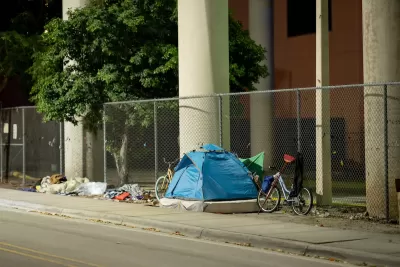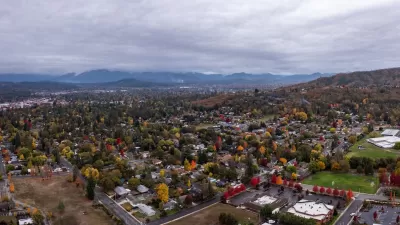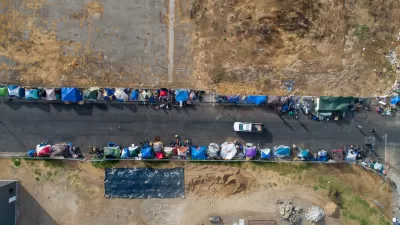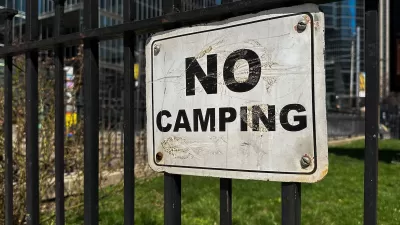Advocates for unhoused people are rallying to protect homeless populations as new legislation criminalizing homelessness rolls out around the country.

The Supreme Court’s decision in Grants Pass v. Johnson continues to have rippling effects throughout the country, prompting advocates for unhoused people to renew their efforts to alleviate the homelessness crisis and prevent the criminalization of homelessness.
As Roshan Abraham explains in an article for Next City, some state and local governments are taking advantage of the ruling to create more punitive laws and further criminalize homelessness and encampments. “This alarming acceleration of threats to unhoused people has pushed homeless advocacy groups to craft a menu of strategies to protect unsheltered residents. This includes developing new model legislation to prevent criminalization and calling for more federal funding to provide affordable housing.”
The ruling draws into focus the scale of the homelessness crisis in the United States. The article outlines cases in several cities where advocates have been fighting for the rights of unhoused residents. According to the article, “If cities want to reduce encampments without displacing people, the best approach is to provide permanent supportive housing. But absent that, there’s plenty of evidence that people are much more likely to accept offers of single rooms, including hotel and motel rooms, than congregate shelter.”
In many cases, people ‘refuse’ shelter because it doesn’t accommodate partners or pets, or or includes strict regulations such as check-out times and sobriety requirements. For advocates, the Grants Pass ruling brings the need to make local lawmakers understand the root causes of homelessness into sharp focus.
FULL STORY: The Supreme Court’s Grants Pass Decision Has Lit a Fire Under Homeless Advocacy Groups

Alabama: Trump Terminates Settlements for Black Communities Harmed By Raw Sewage
Trump deemed the landmark civil rights agreement “illegal DEI and environmental justice policy.”

Study: Maui’s Plan to Convert Vacation Rentals to Long-Term Housing Could Cause Nearly $1 Billion Economic Loss
The plan would reduce visitor accommodation by 25% resulting in 1,900 jobs lost.

Why Should We Subsidize Public Transportation?
Many public transit agencies face financial stress due to rising costs, declining fare revenue, and declining subsidies. Transit advocates must provide a strong business case for increasing public transit funding.

Paris Bike Boom Leads to Steep Drop in Air Pollution
The French city’s air quality has improved dramatically in the past 20 years, coinciding with a growth in cycling.

Why Housing Costs More to Build in California Than in Texas
Hard costs like labor and materials combined with ‘soft’ costs such as permitting make building in the San Francisco Bay Area almost three times as costly as in Texas cities.

San Diego County Sees a Rise in Urban Coyotes
San Diego County experiences a rise in urban coyotes, as sightings become prevalent throughout its urban neighbourhoods and surrounding areas.
Urban Design for Planners 1: Software Tools
This six-course series explores essential urban design concepts using open source software and equips planners with the tools they need to participate fully in the urban design process.
Planning for Universal Design
Learn the tools for implementing Universal Design in planning regulations.
Smith Gee Studio
Alamo Area Metropolitan Planning Organization
City of Santa Clarita
Institute for Housing and Urban Development Studies (IHS)
City of Grandview
Harvard GSD Executive Education
Toledo-Lucas County Plan Commissions
Salt Lake City
NYU Wagner Graduate School of Public Service





























